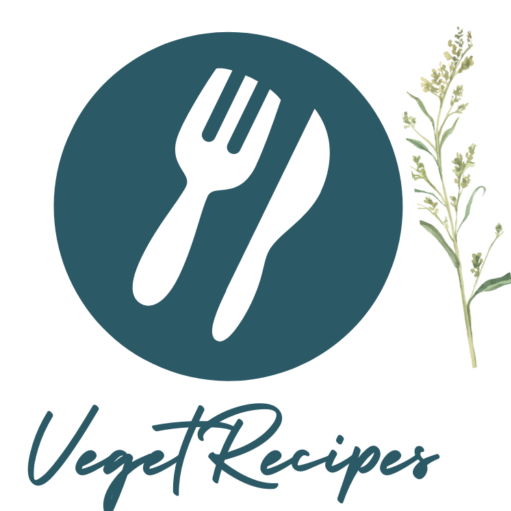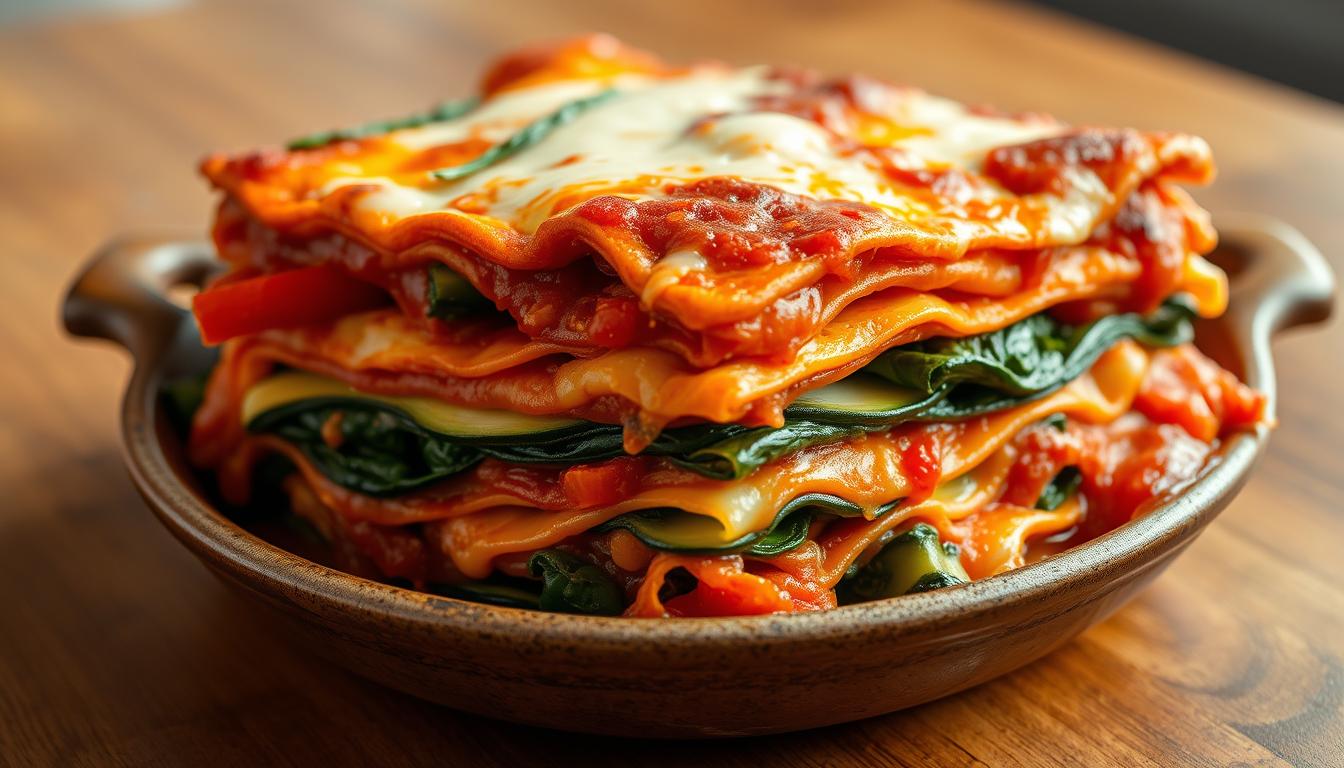Can a meatless lasagna really satisfy your cravings for hearty comfort food? Many people wonder if a easy vegetarian lasagna recipe can match the rich flavors of meat-based lasagna.
In this article, we’ll show you how to make an easy vegetarian lasagna that will impress. It has layers of fresh veggies, delicious cheese, and perfectly cooked pasta. This dish is not only healthy but also budget-friendly and satisfying. It’s perfect for those looking for a tasty vegetarian pasta casserole or wanting to add more meatless meals to their diet.
Key Takeaways
- Learn how to create a delectable vegetarian pasta casserole.
- Discover essential ingredients for a healthy veggie lasagna.
- Get tips on preparing and sautéing the best vegetables.
- Understand the pros and cons of homemade versus store-bought tomato sauce.
- Perfect your lasagna layering technique and avoid common mistakes.
- Find out why resting your lasagna is important and how to serve it perfectly.
Ingredients for Easy Vegetarian Lasagna
Making a tasty vegetarian lasagna starts with the right ingredients. You’ll need both the basics and some optional extras. This mix ensures your lasagna is both flavorful and satisfying.
Essential Ingredients You’ll Need
First, gather the main ingredients for your vegetable lasagna. These include:
- Lasagna noodles
- Ricotta cheese
- Mozzarella cheese
- Parmesan cheese
- Zucchini
- Bell peppers
- Mushrooms
- Onions
- Garlic
- Tomato sauce
- Olive oil
These items are the base of your simple vegetarian lasagna. Choose fresh, quality ingredients for better taste and texture.

Optional Ingredients for Extra Flavor
For more flavor, add these optional ingredients:
- Spinach
- Artichokes
- Kale
- Fresh basil
- Oregano
- Red pepper flakes
- Sun-dried tomatoes
These extras can elevate your lasagna from good to great. Feel free to mix and match to suit your taste and dietary needs.
| Essential Ingredients | Optional Ingredients |
|---|---|
| Lasagna noodles | Spinach |
| Ricotta cheese | Artichokes |
| Mozzarella cheese | Kale |
| Parmesan cheese | Fresh basil |
| Zucchini | Oregano |
| Bell peppers | Red pepper flakes |
| Mushrooms | Sun-dried tomatoes |
Preparing the Vegetables
Making an easy vegetable lasagna starts with picking the right veggies. It’s key to use fresh, seasonal produce for the best taste and texture. We’ll look at the top veggies to use and how to sauté them just right.
Best Vegetables to Use
For a tasty and filling vegetarian lasagna, try these veggies:
- Eggplants: Their meaty texture makes a great base.
- Carrots: They add a sweet taste and crunch.
- Zucchini: It has a mild flavor and perfect texture for layers.
- Bell Peppers: Red, yellow, or green peppers bring color and zest.
- Spinach: It’s a nutrient-rich, leafy green layer.
- Mushrooms: They boost the umami flavor.

Tips for Sautéing Vegetables
- Preheat your pan: Make sure your pan is hot before adding veggies. This helps them sauté evenly without steaming.
- Use the right amount of oil: A moderate amount of olive oil is best. It coats the veggies evenly without making them greasy.
- Season adequately: Add salt and pepper while sautéing. It enhances the veggies’ natural flavors.
- Sauté in batches: Don’t overcrowd the pan. This ensures each veggie cooks evenly and gets the right tenderness.
- Monitor the heat: Adjust the heat as needed. Too high can burn the veggies, while too low can make them soggy.
Choosing the Right Pasta
When making your easy vegetarian lasagna, picking the right pasta is key. It affects the dish’s structure and texture. You can choose from classic lasagna noodles or gluten-free options.
Types of Pasta for Lasagna
The pasta you pick can change your lasagna’s taste and feel. Traditional lasagna noodles are a solid choice, giving a firm base for your layers. No-boil lasagna sheets save time, while fresh pasta adds a tender, delicious touch.
Each pasta type has its own benefits. This lets you customize your vegetarian pasta casserole just right.
Gluten-Free Options
If you need gluten-free pasta, there are great options. Brands like Barilla and Tinkyada make gluten-free lasagna noodles. These ensure everyone can enjoy your vegetarian pasta casserole.

For more on this dish, check out this Vegetarian Lasagna Casserole. It offers tips and variations for different diets and tastes.
Making the Tomato Sauce
A flavorful tomato sauce is key to a great vegetarian lasagna. Making your own sauce means you get freshness and a deep flavor. We’ll look at both homemade and store-bought options.
Simple Homemade Tomato Sauce Recipe
Making your own tomato sauce is easy and needs just a few ingredients. Follow these steps for a sauce that’s perfect with your lasagna:
- Ingredients: Fresh ripe tomatoes, garlic, olive oil, fresh basil, salt, and pepper.
- Preparation: Sauté minced garlic in olive oil until it smells great. Add peeled and chopped tomatoes, and cook until they turn into sauce.
- Seasoning: Mix in chopped fresh basil, salt, and pepper. Let it simmer for 20-30 minutes to deepen the flavors.
Store-Bought Sauce: Pros and Cons
Store-bought tomato sauces can save time. Here are some things to think about when choosing a pre-made sauce:
| Pros | Cons |
|---|---|
| Time-saving | May contain added sugars |
| Consistent flavor | Possible preservatives and additives |
| Widely available | Less control over fresh ingredients |
When picking a store-bought sauce, look for low-sodium options without added sugars or preservatives. This makes your lasagna healthier and just as tasty.
Assembly of the Lasagna
Building the perfect lasagna is an art that needs careful attention. It’s important whether you’re making a classic or an easy vegetable lasagna. The layering is key to a dish that looks and tastes great.
Layering Techniques
Begin your veggie lasagna recipe with a tomato sauce base. This keeps the pasta from sticking and ensures moisture is spread evenly. Next, add pasta sheets, then sautéed veggies, and a layer of ricotta or cheese.
Keep repeating these layers until you end with a sauce layer and mozzarella on top. This will give your lasagna a golden finish.
Common Mistakes to Avoid
Don’t overfill each layer, as it can make the lasagna fall apart. Make sure to spread ingredients evenly to avoid dry pasta or too much sauce. Also, remember to pre-cook or soak pasta sheets if needed.
By following these tips, you’ll make an easy vegetable lasagna that’s both sturdy and tasty.
Baking the Lasagna
Baking is key when all parts of your vegetarian lasagna come together. The right oven temperature and baking time are vital. They ensure your dish is cooked perfectly without drying out. Here are some tips for baking a delicious simple vegetarian baked lasagna.
Ideal Temperature and Time
Start by preheating your oven to 375°F (190°C). Cover the lasagna with aluminum foil for the first part of baking. This keeps moisture in and helps it cook evenly.
- Covered Baking: Bake for 25-30 minutes.
- Uncovered Baking: Remove the foil and bake for an extra 15-20 minutes. This lets the cheese get golden brown.
Tips for Perfecting the Cheese on Top
A golden, crispy cheese topping is the lasagna’s highlight. Here’s how to get it right:
- Cheese Mixture: Mix mozzarella, parmesan, and ricotta for a tasty topping.
- Extra Ingredients: Add herbs like basil or oregano for extra flavor and a professional look.
- Broil for the Finish: Broil for 2-3 minutes at the end. Watch closely to avoid burning, but it adds a nice crisp to the cheese.
Letting It Rest
Resting your freshly baked lasagna is a key step that’s often skipped. It lets your healthy veggie lasagna blend flavors perfectly. It also makes it easier to serve by stabilizing the structure.
Why Resting Is Important
Resting is vital for any easy vegetarian lasagna recipe. It allows the layers to set. When lasagna comes out of the oven, it’s hot and cooking.
Cutting into it right away can make the layers fall apart. Resting gives the lasagna time to cool and firm up. This way, it holds together beautifully when sliced.
How to Know When It’s Ready
To know when your healthy veggie lasagna is ready, watch for a few signs. It should have a firmer texture and the sauce should not be runny. Usually, resting for 15-20 minutes is enough.
- Visual Check: The lasagna should no longer be bubbling vigorously.
- Tactile Check: Carefully touch the center; it should be warm but not scorching.
By following these resting tips, your easy vegetarian lasagna recipe will always be a hit. It will impress your family and guests.
Serving Suggestions
When you serve your veggie lasagna, aim to make a meal that everyone will love. Pairing it with the right sides and drinks can make your dinner feel like a fancy restaurant meal at home.
Complementary Side Dishes
Side dishes can really make your veggie lasagna shine. Here are some great options to try:
- Garlic Bread: It’s crispy outside and soft inside, making it a perfect match.
- Crisp Green Salad: A fresh salad with a tangy dressing can cut the richness of the lasagna.
- Roasted Vegetables: Seasonal roasted veggies add color and nutrition to your plate.
Perfect Pairings for Your Lasagna
Choosing the right drinks can elevate your lasagna experience. Here are some top picks:
- Red Wine: Chianti or Merlot can bring out the flavors of the tomato sauce and cheese.
- Herbal Teas: Teas like chamomile or mint are calming and refreshing.
- Sparkling Water: A lemon or lime sparkling water adds a fun fizziness.
With these ideas, your veggie lasagna will be the highlight of a wonderful meal.
Storing Leftovers
Storing your leftover vegetarian lasagna right keeps its taste and texture great for later. Here’s how to store it and reheat it perfectly.
Best Ways to Store Vegetarian Lasagna
To keep your vegetarian lasagna fresh and tasty, follow these steps:
- Refrigerator: Let the lasagna cool down first. Then, put it in an airtight container. It stays good in the fridge for 3-5 days.
- Freezer: For longer storage, wrap each portion in plastic wrap and then foil. Put them in a freezer-safe bag. It lasts up to 3 months in the freezer.
Reheating Tips for Optimal Flavor
Reheating your leftover lasagna right is key to keeping its flavor and texture. Here are some tips:
- Oven Method: Heat your oven to 350°F (175°C). Put the lasagna in a dish, covered with foil. Heat for 20-25 minutes until it’s warm.
- Microwave Method: Put a portion on a microwave-safe plate. Cover it with a lid or another plate. Heat on medium for 2-3 minutes, checking until it’s warm.
- Skillet Method: For a crispy bottom, heat a slice in a non-stick skillet over low heat. Cover and heat for 10 minutes, or until warm.
Variations on the Classic Recipe
There are many tasty variations of vegetarian lasagna to try. You can choose from creamy textures to Mediterranean flavors. Each one offers a unique taste and texture, making lasagna exciting again.
Spinach and Ricotta Variation
The spinach and ricotta version is perfect for creamy lovers. It layers sautéed spinach with smooth ricotta cheese. This mix contrasts well with tomato sauce.
Fresh or frozen spinach adds flavor and nutrition. To make it, replace some veggie layers with ricotta and spinach. Enjoy the creamy outcome.
Mediterranean-Inspired Variations
Try a Mediterranean twist for a savory flavor. This version includes olives, capers, sun-dried tomatoes, and feta cheese. These ingredients create a unique taste.
Olives and capers add a salty taste, while sun-dried tomatoes are sweet. Feta cheese brings a tangy creaminess. This makes your lasagna a Mediterranean feast.
These variations refresh the classic lasagna recipe. They cater to different tastes, from creamy to bold. Try the spinach and ricotta or Mediterranean versions. They’re sure to be a hit at home. Experiment to find your favorite.

